Local
Hundreds march against anti-LGBT violence
D.C. police chief, four Council members join demonstration
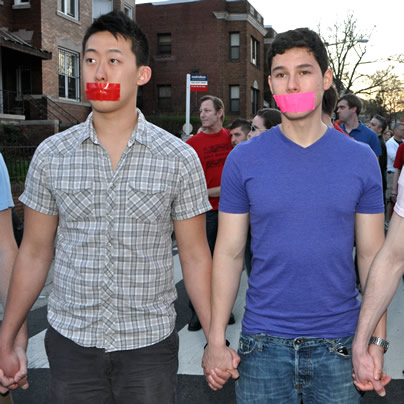
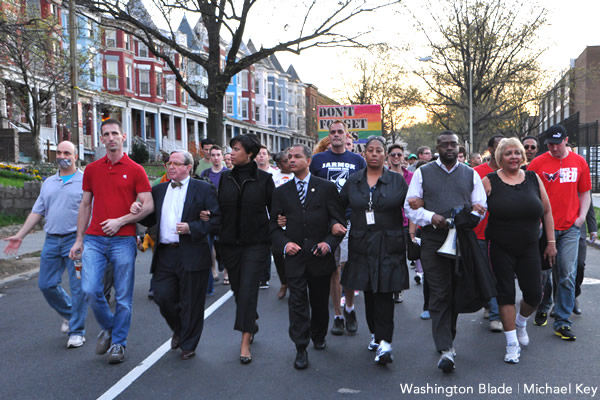
Mayor's Office LGBT liaison Jeffrey Richardson, and council members Muriel Bowser and Jim Graham join D.C. residents in calling for an end to anti-LGBT violence. (Washington Blade photo by Michael Key)
As many as 700 people turned out for a march through the streets of Washington, D.C., Tuesday night to take a stand against anti-LGBT violence following separate attacks against two gay men and a transgender woman during a two-day period earlier this month.
Friends of one of the two gay male victims, who organized the march, said they were astonished over the outpouring of support that emerged from the LGBT community and city officials, including D.C. Police Chief Cathy Lanier and four members of the City Council.
“It was a Facebook event and I expected maybe 15 to 50 people to show up,” said Patrick Pressman, one of the lead organizers. “And then from there it just exploded,” he said. “It got to where it was today, when it was estimated that about 700 people were going to attend.”
Pressman said he is a friend of a 29-year-old gay man who was robbed and badly beaten on March 12 by assailants who called him anti-gay names at Georgia Avenue and Irving Street, N.W.
The march started outside the International House of Pancakes restaurant at 14th and Irving streets, N.W., in Columbia Heights, where a 31-year-old gay man was shot about 6 a.m. Sunday, March 11, in what police say was an altercation with two men who called him anti-gay names.
Lanier, who spoke to the marchers as they gathered outside the IHOP restaurant, said she expects an arrest in the case soon, saying she is “very pleased” with the progress of the investigation.
“We have everybody working on this and I think everybody’s committed,” she said. “We kind of take it personally when people in our community are targeted.”
SEE DOZENS OF PICTURES FROM THE MARCH IN THE WASHINGTON BLADE PHOTO GALLERY HERE.
Police said the victim of the IHOP shooting was fortunate to have received a non-life threatening gunshot wound. His cousin, who was with him at the time of the shooting, said the victim was expected to be released from the hospital this week after being treated for a punctured liver.
Gay D.C. Council member Jim Graham (D-Ward 1), who participated in the march, said he was especially concerned that two of the incidents took place in his ward. He said the large showing of support for the march demonstrates that the community is outraged over anti-LGBT violence.
From the IHOP, the march traveled east on Irving Street to Georgia Avenue, the site where the 29-year-old gay man was attacked and beaten about 9:30 p.m. on March 12.
Police said the transgender woman was attacked and knocked unconscious about 11:45 that same night at the intersection of West Virginia Avenue and Mt. Olivet Road, N.E. People who know the victim said she reported later that she was not robbed and thought the attack was motivated by anti-transgender bias.
But police say, unlike the other two incidents, they have not listed the case as a hate crime because they don’t have sufficient evidence for such a classification. Assistant D.C. Police Chief Peter Newsham told a meeting of the Gertrude Stein Democratic Club Monday night that investigators were looking for witnesses who might have heard whether the attackers hurled anti-trans names at the victim.
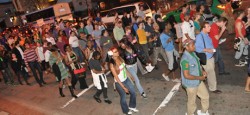
Hundreds of marchers joined the hastily assembled march organized after a recent spate of anti-gay violence in the nation's capital. (Washington Blade photo by Michael Key)
Newsham said investigators believe the three incidents were unrelated, with the attacks carried out by different groups of perpetrators.
The march paused when it reached the site where the 29-year-old gay man was attacked at Georgia Avenue and Irving Street.
“I want to say that this walk should never have to happen again in our city,” said D.C. Council Chair Kwame Brown (D-At-Large). “We have to do more. We must do more,” he said. “And for those who know about this horrific situation that took place, I’m begging you to come forth. Give us information … to bring these folks to justice.”
Brown was referring to reports by police that many people were on the street in the vicinity of the attack at the time it occurred.
Council members Michael Brown (D-At-large) and Muriel Bowser (D-Ward 4) also participated in the march, saying they were in solidarity with the LGBT community in seeking ways to curtail hate violence against all city residents.
Also participating in the march was Jeffrey Richardson, director of Mayor Vincent Gray’s Office of LGBT Affairs, and Gustavo Velasquez, director of the D.C. Office of Human Rights. Richardson spoke at the gathering outside the IHOP restaurant.
Among those speaking at the Georgia Avenue and Irving Street site was A.J. Singletary, president of the D.C. group Gays and Lesbian Opposing Violence (GLOV). Singletary said he learned from the 29-year-old gay victim’s partner that the victim had been released from the hospital Tuesday, the day of the march.
“His jaw was shattered in two places,” said Singletary. “After two surgeries he now has permanent titanium plates holding his lower jaw together. In addition, his jaw is wired shut for the next four to six weeks.”
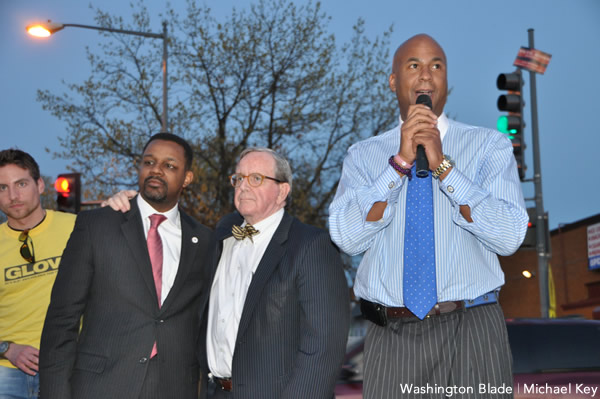
A.J. Singletary, Kwame Brown, Jim Graham, and Michael Brown at the rally. (Washington Blade photo by Michael Key)
The march continued south on Georgia Avenue to U Street, where it turned right and traveled to 14th Street. From there, with spectators looking on from the sidewalks, it traveled south on 14th to R Street, where it turned right and continued to its termination at 17th Street next to the gay bar Cobalt. Many of the marchers entered Cobalt, which hosted a fundraiser for the victim attacked at Georgia Avenue and Irving Street.
Gay Democratic activist Cartwright Moore, a member of the staff of D.C. Congressional Del. Eleanor Holmes Norton, said many of the march participants were young LGBT people who don’t ordinarily attend meetings of local LGBT organizations.
“It’s been great that the community has come together on an issue like this,” said D.C. resident Chris Shank, who said he learned about the march through a Facebook invitation.
“I marched the entire way,” he said. “I’m really glad it was organized. I think the response has been enormous.”
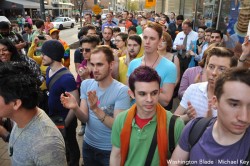
The event was largely organized through social networks like Facebook and Twitter, and the overwhelming number of young people in the crowd reflected these new media organizing tactics. (Washington Blade photo by Michael Key)
D.C. resident Phillip Pratt said he, too, learned of the event through Facebook. He said he became motivated to get involved after seeing that just a few days after organizers posted the event more than 500 people had committed to joining the march.
“I think it was very important to come out and march for this, to march with them and show our support,” he said.
Vic Suter said she wanted to take a stand against violence targeting her own community.
“Whether there be a thousand people marching down the street or five, it says that people are not going to tolerate such behavior and that we need to bring about tolerance and we need to teach the community that people are people regardless of who they love,” she said.
Asked if he thought the event would have an impact on the community, Singletary said he was hopeful that it would.
“We have a group of many hundreds walking down the middle of the street down major thoroughfares in D.C. where a lot of hate crimes have occurred,” he said while marching. “You’re talking about U Street, you’re talking about 14th Street. The street we’re on now is R. There have been a lot of attacks on this street itself. So the response by the community has been big and rightfully so.”
District of Columbia
Gay GOP group hosts Ernst, 3 House members — all of whom oppose Equality Act
Log Cabin, congressional guest speakers mum on June 25 event

U.S. Sen. Joni Ernst (R-Iowa) and three women Republican members of the U.S. House appeared as guest speakers at the June 25 meeting of Log Cabin Republicans of D.C., the local chapter of the national LGBTQ Republican group with that same name.
The U.S. House members who joined Ernst as guest speakers at the Log Cabin meeting were Celeste Maloy (R-Utah), Kat Cammack (R-Fla.), and Julia Letlow (R-La.).
Neither D.C. Log Cabin Republicans President Andrew Minik nor spokespersons for Ernst or the three congresswomen immediately responded to a request by the Washington Blade for comment on the GOP lawmakers’ appearance at an LGBTQ GOP group’s meeting.
“Please join us for an inspiring evening as we celebrate and recognize the bold leadership and accomplishments of Republican women in Congress,” a D.C Log Cabin announcement sent to its members states.
“This month’s meeting will highlight the efforts of the Republican Women’s Caucus and explore key issues such as the Protection of Women and Girls In Sports Act and the broader fight to preserve women’s spaces in society,” the message says.
It was referring to legislation pending in Congress calling for banning transgender women from participating in women’s sports events.
According to media reports, Ernst and the three congresswomen have expressed opposition to the Equality Act, the longstanding bill pending in Congress calling for prohibiting discrimination based on sexual orientation and gender identity in the areas of employment, housing, and public accommodations.
The Log Cabin announcement says the meeting was scheduled to take place at the Royal Sands Social Club, which is a restaurant and bar at 26 N St., S.E. in the city’s Navy Yard area.
D.C. Log Cabin member Stuart West, who attended the meeting, confirmed that Ernst and the three congresswomen showed up and spoke at the event.
“It was a good turnout,” he said. “I would definitely say probably 30 or 40 people attended.” West added, “Four women came to talk to a group of mostly gay men. That’s something you don’t see very often.”
District of Columbia
D.C. police seek public’s help in July 5 murder of trans woman
Relative disputes initial decision not to list case as hate crime

D.C. police are seeking help from the public in their investigation into the murder of a transgender woman who they say was shot to death at about 12:30 a.m. on Saturday, July 5, on the 2000 block of Benning Road, N.E.
But the police announcement of the fatal shooting and a police report obtained by the Washington Blade do not identify the victim, 28-year-old Daquane ‘Dream’ Johnson of Northeast D.C., as transgender. And the police report says the shooting is not currently listed as a suspected hate crime.
It was local transgender activists and one of Johnson’s family members, her aunt, who confirmed she was transgender and said information they obtained indicates the killing could have been a hate crime.
“On Saturday, July 5, at approximately 12:51 a.m., Sixth District officers were flagged down in the 2000 block of Benning Road, Northeast, for an unconscious female,” a July 5 D.C. police statement says. “Upon arrival, officers located an adult female victim suffering from gunshot wounds,” it says.
“D.C. Fire and EMS responded to the scene and transported the victim to a local hospital where after all lifesaving efforts failed and the victim was pronounced dead,” the statement says.
A separate police flyer with a photo of Johnson announces an award of $25,000 was being offered for information leading to the arrest and conviction of the person or persons responsible for the murder.
The flyer identifies D.C. police Homicide Detective Natasha Kennedy as being the lead investigator in the case and says anyone with information about the case should contact her at 202-380-6198.
Longtime D.C. transgender rights advocate Earline Budd told the Blade that one of the police investigators contacted her about the case and that she also spoke to Detective Kennedy. Budd said police confirmed to her that Johnson was a transgender woman.

One of Johnson’s family members, Vanna Terrell, who identified herself as Johnson’s aunt, told the Blade that Johnson used the first name of Dream and had planned to legally adopt that name instead of Daquane but had not gotten around to doing so.
Terrell said she and other family members learned more about the incident when one of two teenage high school students who knew Johnson’s brother contacted a friend and told the friend that they recognized Johnson as they witnessed the shooting. Terrell said the friend then called her to tell her what the friend learned from the two witnesses.
According to Terrell, the witnesses reportedly saw three men approach Johnson as Johnson walked along Benning Road and one of them called Johnson a derogatory name, leading Terrell to believe the men recognized Johnson as a transgender woman.
Terrell said one of the witnesses told the friend, who spoke to Terrell, that the man who shot Johnson kept shooting her until all of the bullets were fired. Budd, who said she spoke to Terrell, who also told her what the witnesses reported, said she believed the multiple shots fired by the shooter was an “overkill” that appears to have been a hate crime. Terrell said she too believes the murder was a hate crime.
In response to an inquiry from the Blade, Officer Ebony Major, a D.C. police spokesperson, stated in an email, “At this point there is nothing in the investigation that indicates the offense was motivated by hate or bias.”
Terrell said a memorial gathering to honor Johnson’s life was scheduled to be held Saturday, July 12, at River Terrace Park, which is located at 500 36th St., N.E. not far from where the shooting occurred.

District of Columbia
LGBTQ voters divided in Ward 8 special election
All four candidates on DC Council seat ballot are allies

Political observers, including LGBTQ activists, believe LGBTQ voters in Ward 8, like most if not all voters in the ward, are divided over which of the four candidates to support in the July 15 special election to fill the ward’s vacant D.C. Council seat.
Each of the four candidates, all of whom are Democrats, including ousted Ward 8 council member Trayon White, who is running to recapture his seat, have expressed support for LGBTQ related issues.
The special election was called earlier this year after the D.C. Council voted unanimously to expel White following his indictment and arrest by the FBI on a federal bribery charge in August 2024.
He has pleaded not guilty to the charge and under D.C. law he can legally run for and regain his council seat until the time he is convicted of the charge. His trial is scheduled to begin in January 2026.
The three candidates challenging White — Sheila Bunn, Mike Austin, and Salim Adofo — are longtime Ward 8 community advocates who have been involved in local government affairs for many years and, according to LGBTQ activists who know them, have been supportive of LGBTQ rights.
White also has a record of supporting LGBTQ issues while serving on the council since 2017. Following his indictment, he won re-election by a wide margin in the November 2024 general election against a lesser-known Republican opponent.
Political observers say White’s indictment on a bribery charge is likely to alienate some of his past supporters, but they say he remains popular in the ward, and with three candidates dividing the opposition vote he could win the election with less than 50 percent of the divided vote count.
Two of the candidates, Bunn and Adofo, responded to a request by the Washington Blade sent to each of the four candidates asking for a statement summarizing their positions on LGBTQ related issues. In their respective statements Bunn and Adofo expressed strong support on a wide range of LGBTQ issues.
“In my nearly 30 years of public service, I have consistently supported the rights and worked to improve the quality of life for the LGBTQIA+ community,” Bunn said in her statement. She noted that much of her work on behalf of LGBTQ rights took place when she served as chief of staff for D.C. Congressional Delegate Eleanor Holmes Norton and as a senior staff member for former D.C. Mayor Vincent Gray.
In his statement, Adofo said he advocated for a wide range of LGBTQ issues, including housing programs for homeless LGBTQ youth and supportive employment training programs for transgender residents.
“At the heart of our platform is a steadfast commitment to uplifting LGBTQ+ communities, ensuring that policy is shaped not just for them, but with them,” his statement says. Adofo’s positions in support of LGBTQ rights are also posted on his campaign website.
GLAA D.C, formerly known as the Gay and Lesbian Activists of Washington, released its ratings of three of the four candidates on June 22, based on its recent policy of basing its ratings mostly on non-LGBTQ specific issues. The group rates candidates on a scale of -10, the lowest possible rating, to +10, its highest rating.
It assigned a rating of +7.5 for Bunn, +6.5 for Austin, and +4.5 for Adofo. In a statement accompanying its ratings, GLAA said each of the three have a record of support on LGBTQ issues, but they lost rating points for not supporting non-LGBTQ related issues deemed important by GLAA.
GLAA said it did not issue a rating for White based on its policy of not rating candidates who are removed from office or resign due to allegations of ethics violations.
The Capital Stonewall Democrats, D.C.’s largest local LGBTQ political group, chose not to make an endorsement in the Ward 8 special election.
“We thought that this is best because this is a special election and in these unfamiliar times, we decided not to take a stand,” Howard Garrett, the group’s president, told the Blade.
Ward 8 gay Democratic activist Phil Pannell is supporting Adofo, he told the Blade, on grounds of Adofo’s strong support on LGBTQ issues and Adofo’s role as the only candidate in the Ward 8 special election who supported Initiative 83, the ballot measure passed by D.C. voters in November 2024 calling for a ranked choice voting system and open D.C. primaries. A lawsuit challenging the initiative filed by the D.C. Democratic Party has delayed its implementation.
Another longtime Ward 8 gay Democratic activist, David Meadows, is supporting Bunn. Meadows cites Bunn’s support for LGBTQ rights and her positions on other issues he supports as his reason for backing her candidacy.
The D.C. Board of Elections website shows that the board mailed ballots for the special election to all Ward 8 registered voters. The website shows that as of July 7, 2,483 voters sent back their ballots by mail or placed them in drop boxes located throughout the ward.
Early in-person voting at several polling places was scheduled to begin July 11, the website says, prior to the official election date of July 15 at all polling places throughout the ward.
Salim Adofo statement on LGBTQ issues:
Our campaign is rooted in the belief that everyone deserves to live with dignity, security, and opportunity. We are committed to building a safer, healthier, and more equitable District for all — where every voice is heard and every community is empowered. At the heart of our platform is a steadfast commitment to uplifting LGBTQ+ communities, ensuring that policy is shaped not just for them, but with them. We recognize that the fight for equity is interconnected, and we prioritize action in the areas that most deeply impact our residents’ daily lives. As [a] council member, I will advocate for healthcare for all, boost funding for HIV/AIDS, Hepatitis, STD, and TB Administration (HAHSTA) programs to address disparities in health outcomes.
• Expand access to care by exempting digital-only telehealth services from the Certificate of Need (CON) process and increasing funding through the Department of Behavioral Health (DBH).
• Build a culturally competent workforce by removing licensure barriers and expanding the pipeline of LGBTQ+ mental health providers.
• Employment and economic equity: sustain workforce development efforts like Project LEAP, a successful investment in economic empowerment for TGD residents.
• Foster public-private partnerships by requiring D.C. HR to work with labor unions and local employers to host trans-affirming job fairs.
• Fund community-led training by supporting programs developed by TGD organizations, modeled after California’s Transgender Economic Empowerment Initiative.
• Housing with dignity: every LGBTQ+ resident deserves stable, affirming, and permanent housing. End youth homelessness with a community-centered strategic plan focused on expanding permanent housing and wraparound services.
• Support inclusive housing by continuing funding for LGBTQ+ housing vouchers and senior housing initiatives.
• Safety and community support: create safe shelters by investing $2 million in a 20-bed LGBTQIA2S+ shelter for survivors of intimate partner violence and sexual assault.
• Empower community organizations with no-cost capacity-building support and streamlined access to D.C. grants for LGBTQ+-serving CBOs.
Sheila Bunn statement on LGBTQ issues:
In my nearly 30 years of public service, I have consistently supported the rights and worked to improve the quality of life for the LGBTQIA+ community.
As chief of staff to Congresswoman Eleanor Holmes Norton, I helped prevent Congress from overturning the District’s 2009 marriage equality bill and worked on removing congressional riders from the District’s budget that prohibited the expenditure of locally raised funds for our needle-exchange program, which has been pivotal in HIV/AIDS prevention.
As part of Mayor Vincent C. Gray’s senior staff, I assisted in launching the District’s transgender employment initiative under the Project Empowerment Program, increasing training and job opportunities for transgender residents. We also employed a member of the transgender cohort in the Mayor’s Office of Community Affairs after their tenure, demonstrating our commitment to the program. I facilitated efforts to end health insurance discrimination based on gender identity with DISB’s 2013 bulletin, ensuring coverage for services like mastectomies and hormone replacement therapy. Additionally, I helped to coordinate Mayor Gray’s first LGBTQIA+ Youth Town Hall to address the concerns of LGBTQIA+ youth and participated in cultural competency training to better support the District’s significant LGBTQIA+ population.
Currently, I am a member of the Capital Stonewall Democrats, actively engaging in Pride events and supporting LGBTQIA+ causes like the DC LGBTQ+ Community Center, a one-stop shop for services and programs with critical social service partners. Through direct outreach to organizations serving the LGBTQIA+ community, I aim to understand and represent their issues effectively. I look forward to collaborating with GLAA, Capital Stonewall Democrats, and other allied organizations to shape legislation and policies that benefit our LGBTQIA+ residents and all District residents.
-

 Virginia2 days ago
Virginia2 days agoDefying trends, new LGBTQ center opens in rural Winchester, Va.
-

 South Africa5 days ago
South Africa5 days agoLesbian feminist becomes South African MP
-

 Travel4 days ago
Travel4 days agoManchester is vibrant tapestry of culture, history, and Pride
-

 Opinions3 days ago
Opinions3 days agoUSAID’s demise: America’s global betrayal of trust with LGBTQ people










